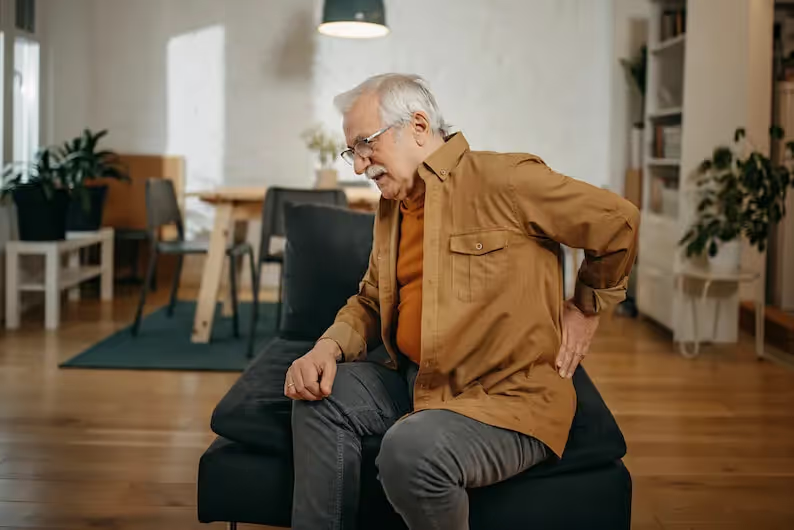Kidney stones are one of the most painful kidney conditions, affecting one in 10 people. Once you have had one, you are more prone to developing others. That's why it's important to be able to identify kidney stones symptoms in elderly adults. If you've ever had a kidney stone, you know just how excruciating the pain can be. Fortunately, there are steps and lifestyle adjustments you can make to prevent kidney stones in older adults.
What Are Kidney Stones?
A kidney stone is a hard object made out of minerals and acid salts that crystalize and stick together in concentrated urine. These mineral deposits can form in your kidneys or anywhere along your urinary tract, including your bladder, urethra, or ureter. The size and type of kidney stone can vary and determines the severity of the condition. Smaller kidney stones in older adults can usually pass through the urinary tract with minor pain, while larger stones can be quite painful and even result in the need for medical intervention.
Types of Kidney Stones
There are four main types of kidney stones. Calcium stones – Also known as oxalate and phosphate stones, calcium kidney stones are the most common form, making up 80 percent of cases. These types of stones form when the concentration of calcium in the urine becomes too high. Uric acid stones – These are the second most common type of kidney stone and occur when acidic levels are too high in the urine. Uric acid stones are typically associated with diseases like gout, diabetes, obesity, and metabolic conditions. Struvite stones – These stones are composed of ammonium, magnesium, and phosphate salts and occur when urine becomes too alkaline or not acidic enough. These types of kidney stones aren't as common and usually develop in people who experience frequent urinary tract infections. Cystine stones – The rarest type of kidney stone, cystine stones develop from excess cystine, an amino acid that makes up protein and naturally occurs in the body.
Kidney Stones Symptoms
Usually, one of the first signs of a forming kidney stone is pain in your mid-back or side. A kidney stone in older adults may not produce any symptoms until it begins to pass into one of the ureters. The ureters are the tubes that connect the kidneys and bladder. If a kidney stone gets lodged in one of the ureters, it could block the flow of urine, resulting in your kidney beginning to swell. This can cause the ureter to spasm. Kidney stone pain can come and go in waves and fluctuate in intensity. Many who pass kidney stones find it very difficult to find a comfortable position. Kidney stone symptoms can include:
- Intense pain in the lower abdomen, back or side, and/or the groin
- Nausea or vomiting
- Fever and chills
- Pain or burning sensation while urinating
- Pink, red, or brown urine
- Cloudy or foul-smelling urine
- Persistent need to urinate
If you're experiencing any of these symptoms, contact your local VIPcare provider immediately!
Kidney Stone Treatment
When it comes to treatment of kidney stones in the elderly, most will pass on their own within a couple of weeks. However, it can range from days to a matter of weeks, depending on the size and location.
Stay Hydrated
Adequate hydration is crucial for passing kidney stones. You should drink plenty of water throughout the day to help flush out the stones from the urinary tract. Aim for at least eight to 10 glasses of water per day or more if advised by your healthcare professional.
Pain Management
Over-the-counter pain relievers such as ibuprofen or acetaminophen can help alleviate the discomfort associated with kidney stones. You should always consult your healthcare provider before taking any medication, especially if you have pre-existing medical conditions or are taking other medications.
Try Natural Remedies
Some individuals have found relief from kidney stone symptoms by trying natural remedies such as lemon juice, apple cider vinegar, or herbal teas like nettle leaf or dandelion root. However, just like other prescriptions and OTC pain relievers, it's essential to consult your healthcare provider before trying any new remedy, as they may interact with existing medications or conditions.
Use Heat Therapy
Applying a heating pad or hot water bottle to the area of pain can help relax the muscles and alleviate discomfort caused by kidney stones. Seniors should be cautious not to apply heat directly to the skin and limit the duration of heat therapy sessions to avoid burns.
Medical Intervention
In some cases, medical intervention may be necessary to help pass kidney stones. This could include procedures such as lithotripsy (using shock waves to break up the stones), ureteroscopy (inserting a thin tube with a camera to remove the stones), or surgery in severe cases. The ideal situation is to pass stones naturally by drinking 6-8 glasses of water a day and managing pain with over-the-counter pain relievers. In some cases, your provider may prescribe an antibiotic if an infection is present, as well as pain medication if extreme pain persists.
Kidney Stone Prevention in Older Adults
Your lifestyle plays a significant role in the prevention of kidney stones. Making positive lifestyle changes can lower your risk of developing a kidney stone. Stay properly hydrated – Drinking plenty of water prevents dehydration, a common factor in the formation of kidney stones. The goal is to keep your urine as diluted as possible. Your urine should be pale in color, indicating you are drinking enough fluids. Reduce salt intake and animal protein – High-sodium foods and diets can help create kidney stones, while animal protein can also increase your levels of uric acid. Reduce your salt and choose nonanimal protein sources, such as legumes. Eat calcium-rich foods – Sounds counterintuitive, but getting enough calcium from foods can help prevent kidney stones by binding with oxalate before reaching the kidneys. You should talk to your provider about your calcium intake, especially if you suffer from heart or kidney disease. Limit oxalate-rich foods – If you tend to form calcium oxalate stones, you may need to eat fewer foods rich in oxalates. These include rhubarb, beets, okra, spinach, Swiss chard, sweet potatoes, nuts, tea, chocolate, black pepper, and soy products. You can take measures to potentially lower your risk of preventing kidney stones. However, gender, underlying medical conditions, and genetics can play a role in the development and frequency of kidney stones in older adults. You should discuss your risk with your provider and develop a prevention plan that will help keep kidney stones at bay.




